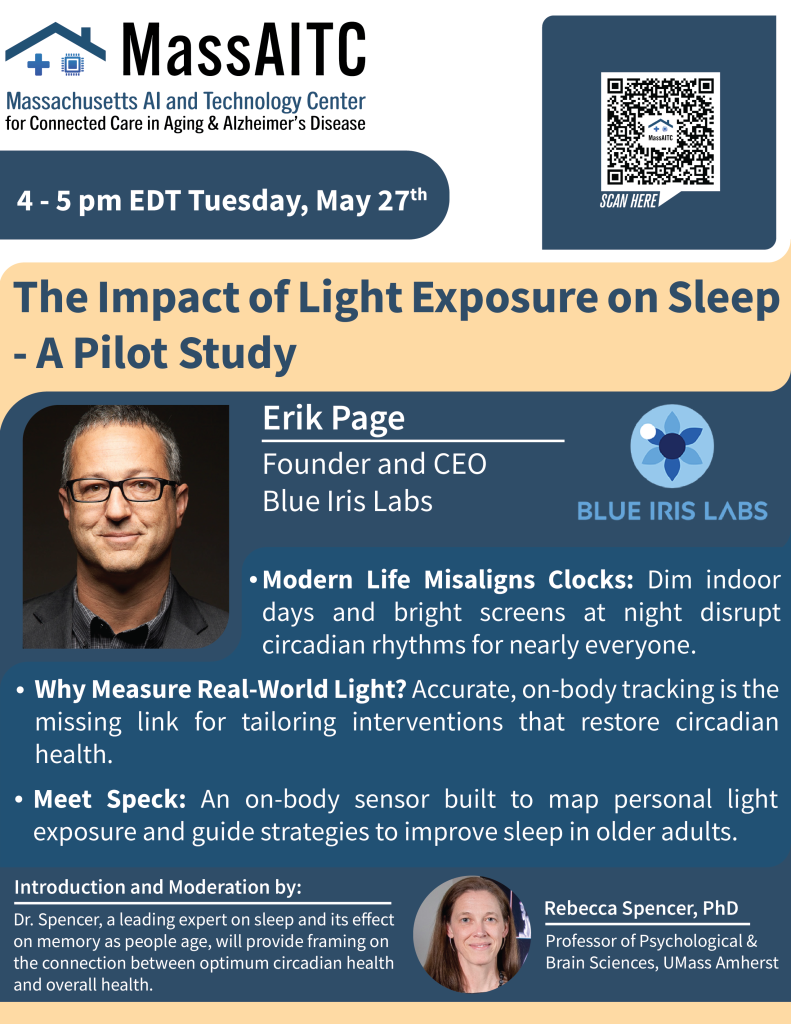
Abstract:
Light exposure is the primary regulator of human circadian rhythms, influencing many aspects of our physiology and behavior, including sleep, alertness, and mood, as well as many neuroendocrine and cognitive functions. While we have evolved experiencing “bright days and dark nights,” most of us now experience significantly darker days and brighter nights than our pre-modern ancestors, likely resulting in widespread circadian disruption. And as we age, the relationship between light exposure, circadian rhythms, and sleep can be further compromised both through normal aging (e.g., less light reaching the retina due to clouding of the lens) and age-related risk factors, such as Alzheimer’s Disease (AD), which is known to damage the brain’s master clock. This webinar will review the current science related to light exposure, circadian rhythms, and sleep, looking at aging and AD populations in particular. We will further discuss how needs in the area led to the development of the Speck – a wearable light exposure device designed to improve the sleep and circadian entrainment of people with AD – and share the results of an a2 pilot clinical study that used the Speck to study correlations between light exposure patterns and sleep metrics.
Biography:
- Erik Page, Founder and Chief Executive Officer at Blue Iris Labs
- Erik Page has been conducting research in lighting related fields for over 30 years including work involving light sources, light sensors, luminaires, lighting control systems and human factors. Lighting sensors, lighting control systems, and the impacts of light on human health have been a particular focus for the last decade where he became a recognized expert. His lighting controls and sensor work has included both the technology side (where Page has several patents) as well as the market and policy side (where he has several research publications). Over Page’s career, his focus has always been on “applied research” where emphasis has been placed on developing promising lighting technologies and transferring them from the laboratory to the marketplace, including during his 15 years at the University of California (10 years as a researcher in the Lighting Research Group at Lawrence Berkeley National Laboratory and 5 years as a founder and Director of Engineering of the California Lighting Technology Center at UC Davis). Now, as a founder and CEO of Blue Iris Labs, he is focused on developing systems that allow people and organizations to quantify the light exposure that people experience in real-world applications. It is his deeply held belief there are significant scientific, social, and commercial benefits to quantifying the light exposure patterns that modern humans experience so that we can better understanding the ways this critical environment input impacts human health.
Introduction and Moderation:
- Rebecca Spencer, PhD, Professor of Psychological & Brain Sciences, UMass Amherst
- Dr. Spencer, a professor in the Psychology Department at UMass Amherst, studies the impact of sleep on learning and its effect on memory as people age. Her recent findings—covered in scientific publications such as the Journal of Neuroscience and Journal of Sleep Research as well as in media such as The New York Times, USA Today, and O, The Oprah Magazine—include scientific substantiation of the old advice to “sleep on it” when trying to make a decision and not sleeping after a traumatic event can lessen its emotional impact.
